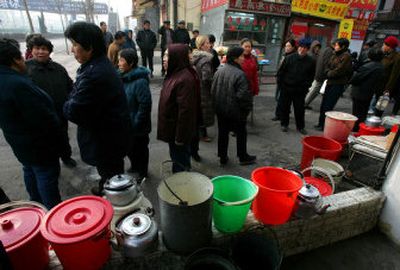Water restored to Chinese city

HARBIN, China – Running water returned to this northeast city of 3.8 million people Sunday, ending a five-day shutdown blamed on a chemical spill that embarrassed the government and highlighted China’s mounting environmental problems.
Water service started returning to this provincial capital shortly before 6 p.m. after the government said toxins spewed into the Songhua River by a chemical plant explosion had returned to safe levels. Residents said service did not resume in some areas for several more hours.
“When that running water came back on, it was a completely wonderful feeling. It’s been four days since I had a shower,” said grinning taxi driver Cao Sijun, 46.
Local television showed the governor of Heilongjiang province, where Harbin is located, drinking a glass drawn from the tap in a Harbin family’s home after service resumed.
But the government warned the public that supplies lying in pipes for five days were too dirty to drink, although safe enough for housecleaning and laundry. It said it would announce on radio and television when the water was safe enough first to bathe in and later to drink.
“We still have to wait a little longer,” sighed Wang Yixin, a 34-year-old entrepreneur. However, she said, “tomorrow we’ll clean the whole apartment and wash all our clothes.”
The deadly Nov. 13 chemical plant explosion in Jilin, a city upstream, was a political disaster for President Hu Jintao’s government and cast a harsh light on the environmental costs of China’s breakneck development.
Hu’s government issued embarrassing apologies to China’s public and to Russia, where a border city downstream is bracing for the arrival of the benzene slick that was 50 miles long.
The pollutants were expected to reach Russian territory within days and Khabarovsk, a city of 580,000, within weeks. A top Russian environmental official, Oleg Mitvol, told the Ekho Moskvy radio Sunday that the nation will airlift 50 tons of activated carbon to treatment plants along the Amur River in a bid to absorb the toxins.
Environmentalists criticized China’s response to the spill and questioned the decision to allow a facility handling such dangerous materials near a key water source.
The government has promised to investigate the spill and punish any officials found responsible. The plant is operated by a subsidiary of China’s biggest oil company, state-owned China National Petroleum Corp.
State media have accused local officials of first concealing and then lying about the explosion, which killed five people and forced the evacuation of 10,000 others.
It was not until this week that the government said the accident dumped 100 tons of benzene into the Songhua. Benzene is used in the manufacture of plastics, detergents and pesticides.
The announcement that Harbin would suspend water service triggered panic-buying of bottled water, soft drinks and milk. Schools closed and residents stocked up on water in bathtubs and tea kettles.
“We filled every pot and bucket,” said Cao, pointing to a row of vessels on the floor of his family’s second-story apartment in a concrete-slab building.
Despite the initial anxiety, many took the water cutoff stoically, lining up in biting cold for supplies from trucks sent daily by the city government. The city also trucked in millions of bottles of drinking water and said it was drilling 100 new water wells to supplement the 918 already supplying hospitals and some residential areas.
“It was a bit hard to take,” said Wang, who lugged supplies up seven flights of stairs to her apartment.
On Sunday, television cameras followed Heilongjiang Gov. Zhang Zuoji into the home of 75-year-old Pang Yucheng, where he drank a glass of boiled tap water.
“It tastes good,” the governor said.
The city government did not say how many days it might be until the water was safe for public consumption.
“The first water is dangerous because it’s been sitting in pipes for five days. We will advise citizens when they can drink the water,” Wang Minghe, deputy general manager of the Harbin water department, told reporters touring a water treatment plant.
The city will cut fees to encourage water use in coming days to flush out the old supply and “enable it to be drinkable sooner,” Wang Minghe said.